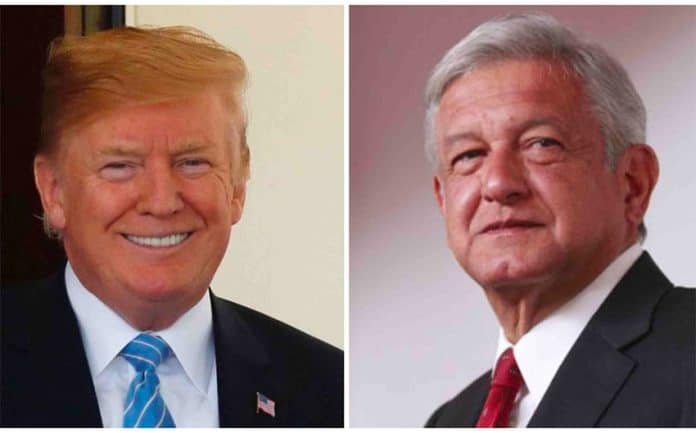The United States has agreed to cut oil production on Mexico’s behalf, President López Obrador said on Friday, a move that apparently ends an impasse on a deal to reduce global output to stabilize crude prices amid the coronavirus pandemic.
Mexico on Thursday refused to lower its daily output by the amount requested by the Organization of the Petroleum Exporting Countries (OPEC).
But López Obrador said that he spoke to United States President Donald Trump on Thursday night and that they agreed that Mexico would cut its production by 100,000 barrels per day (bpd) and that the U.S. would reduce its output by an additional 250,000 bpd.
He said that OPEC+, a group consisting of the organization’s 13 core member nations as well as 10 additional oil-producing nations, initially asked Mexico to cut its production by 400,000 bpd as part of a plan to reduce global output and stabilize crude prices that have fallen sharply as demand plummets due to coronavirus.
However, after Mexico refused, OPEC subsequently lowered its request to 350,000 bpd, López Obrador said. That reduction will be shared by Mexico and the United States.
Saudi Arabia, OPEC’s de facto leader, made the entire oil reduction deal dependent on Mexico’s agreement to cut its production by that amount. The kingdom’s energy minister, Prince Abdulaziz bin Salman, was adamant that the burden of the cuts – which will together reduce global oil production by more than 10% – must be shared as widely as possible among the OPEC+ nations.
However, López Obrador said that the cut Mexico was asked to make was unfair considering that its production is much lower than some other OPEC+ countries and that it is only just starting to recover from a prolonged decline in crude output.
“Producing 12 million barrels a day is not the same as the 1.786 million [barrels that Mexico is producing] and besides [we’re] coming out of a crisis … a production decline during 14 consecutive years. That’s why we couldn’t accept what was originally proposed and we resisted,” he said.
AMLO, as the president is widely known, said that Trump questioned Mexico’s refusal to cut its production when all other OPEC+ nations agreed.
“President Trump started to read out the names of all the countries that had accepted and he says, ‘only Mexico didn’t accept’ and I explained to him why and I made a proposal to him that he fortunately accepted,” he said.
López Obrador said that after he told Trump that Mexico could not cut its oil production by more than 100,000 bpd, “he very generously told me that they were going to help us with the 250,000 additional barrels.”
![]()
“For that, I thank him,” he added. López Obrador said that the cut to which Mexico has now committed represents 5.5% of daily production.
“From 1.786 million bpd on average in March, we’ll go down to 1.686 million barrels; this will apply from May onwards,” he said.
“With this we hope that the price of crude oil will go up … but we especially hope that it will help to stabilize the economy,” López Obrador said, adding that OPEC was notified of the deal struck between Mexico and the United States.
However, OPEC delegates said that they were unaware of the terms of the agreement to which he was referring.
The news agency Bloomberg reported that if the standoff between OPEC+ and Mexico has been resolved, as AMLO claims, “it opens the way for a historic effort to revive the oil market from a debilitating coronavirus-induced slump.”
It noted that the agreement to cut production is much larger than previous interventions and that it would put an end to the price war between Saudi Arabia and Russia that contributed to the slump in global oil prices.
The price for Mexican crude tumbled to a 21-year low of US $10.37 per barrel in the last week of March but was almost 60% above that level on Thursday, closing at $16.54 per barrel.
While most oil producers have reduced their investment and in some cases their output due to the low global oil prices, Pemex Mexico’s state oil company, has not.
In a series of Twitter posts on Friday morning before AMLO announced the agreement with Trump, the director of the Mexico Institute at the Wilson Center was critical of the government’s decision not to agree to OPEC’s request.
“We all know by now that the government is blindly committed to increasing production – nothing (not Covid-19, nor Pemex downgrades, nor endless expert advice) will change that,” Duncan Wood wrote.
“The failure to grasp an opportunity to stabilize oil prices at a time when it is costing much more to pump Mexican oil than the market price, is mind-boggling. At a time of such low oil prices it actually makes economic sense to import crude for domestic refining rather than increase production; why pump oil at a loss?”
After López Obrador’s announcement of the pact with Trump, Wood said that it was unclear how the burden-sharing arrangement will work.
“AMLO has just said that U.S. will be responsible for 250k barrels of Mexico’s cut? I am intrigued to see how that would actually happen!”
